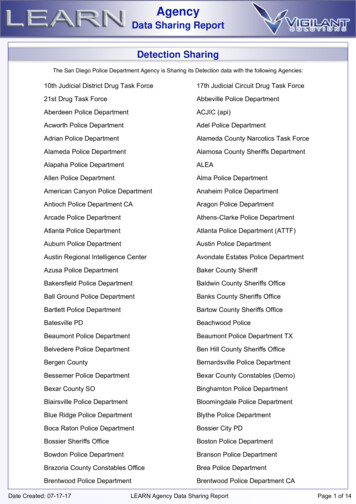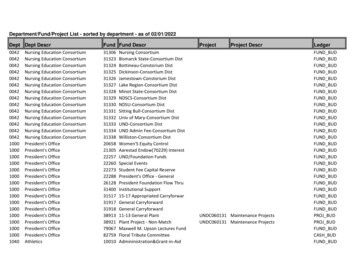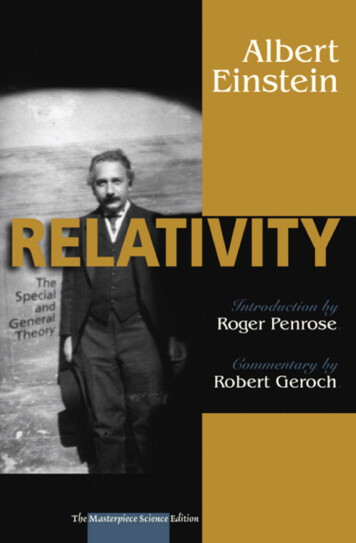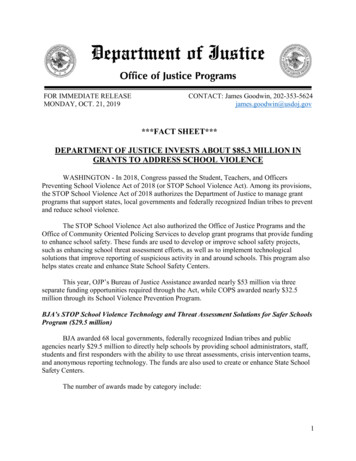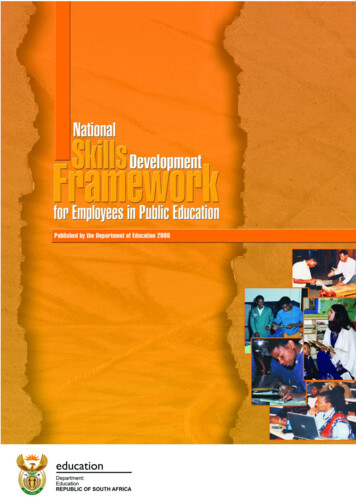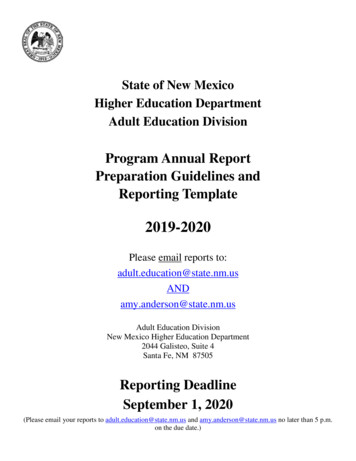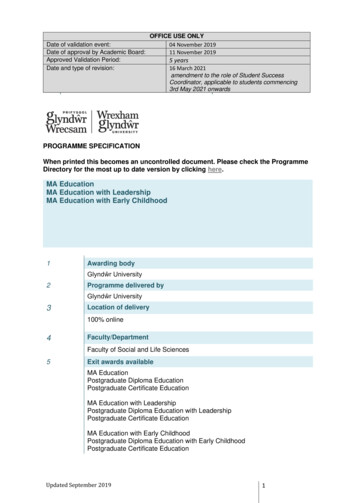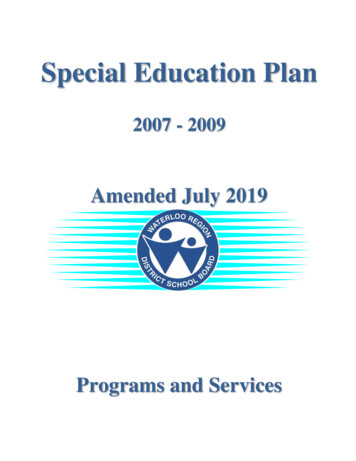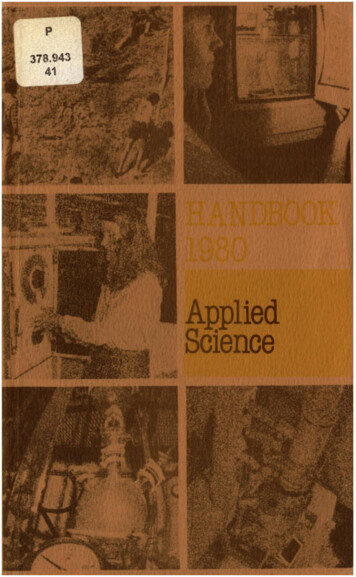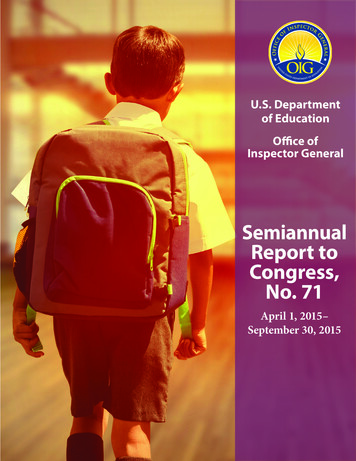
Transcription
U.S. Departmentof EducationOffice ofInspector GeneralSemiannualReport toCongress,No. 71April 1, 2015–September 30, 2015
Office of Inspector GeneralKathleen S. TigheInspector GeneralNovember 2015This report is in the public domain. Authorization to reproduce it in whole or in partis granted. While permission to reprint this publication is not necessary, the citationshould be: U.S. Department of Education, Office of Inspector General, SemiannualReport to Congress, No. 71.Please Note:The Inspector General’s Semiannual Report to Congress, No. 71 is available on theED OIG Web site at .html.All images used under license from Shutterstock.com.
Message to CongressOn behalf of the U.S. Department of Education(Department) Office of Inspector General (OIG), Ipresent this Semiannual Report on the activitiesand accomplishments of this office from April 1, 2015,through September 30, 2015. The audits, investigations,and related work highlighted in the report are products ofour continuing commitment to promoting accountability,efficiency, and effectiveness through our oversight of theDepartment’s programs and operations.Over the last 6 months, we completed 74 investigationsinvolving fraud or corruption related to the Department’sprograms and operations, securing about 50 million insettlements, fines, restitutions, recoveries, forfeitures, andsavings. In addition, as a result of our investigative work,criminal actions were taken against a number of people,including school officials and service providers who cheatedthe students they were in positions to serve. We also issuednine audit reports that contained recommendations toimprove program operations. The following are someexamples of the results of our audits and investigations. Our audit of the Higher Learning Commission’s evaluation of competency-based education programs,including direct assessment programs, found thatthe Commission did not establish a system of internalcontrol that provided reasonable assurance thatthe schools’ programs were properly classifiedfor Federal student aid purposes. As a result, theDepartment could award Federal student aid tostudents enrolled in programs that do not meet eligibility requirements and schools might forgo plansto create innovative and effective competency-basededucation programs due to the uncertainty in howthe Commission classifies these programs.Our audit found that the Department did notcomply with the Improper Payments Elimination andRecovery Act for fiscal year 2014 because it reportedan improper payment rate that did not meet itsreduction target for the William D. Ford Direct Loanprogram; its improper payment estimates and estimation methodologies were inaccurate, incomplete,and unreliable; and its improper payment reportingwas incomplete. Our investigations led to criminal actions against51 school officials, vendors, and service providers,including the owner of a South Carolina charterschool who was sentenced to prison for embezzlingmore than a million dollars from the school, leadersof a charter school in Texas who were indicted forallegedly orchestrating a 2.6 million fraud scam,and a tutoring company and 31 of its employeeswho were indicted for allegedly billing the PuertoRico Department of Education nearly 1 million forservices that were never provided. Our audit of the office of Federal Student Aid’s(FSA) oversight of schools’ administration of Federalstudent aid programs found weaknesses in itsprocess for performing program reviews and howit selects schools for program reviews. As a result,FSA has limited assurance that program reviews areappropriately identifying and reporting all instancesof noncompliance. As a result of our investigative efforts, EducationAffiliates, Inc., a for-profit education company thatoperates 50 schools across the country, agreed topay 13 million to settle claims that it violated theFalse Claim Act by obtaining fraudulent high schooldiplomas and submitting false student aid applications to the Department on behalf of students whowere not qualified to attend the school or receivestudent aid. Three senior executives of Micropower CareerInstitute, a for-profit school chain with five relatedentities located in New York and New Jersey pledguilty to fraud and agreed to a 7.4 million forfeiture as a result of our investigation. We found thatthe owners falsified student records and submittedfraudulent information to the Department to makeit appear that the school was eligible to participatein the Federal student aid programs when it was not. Our audits of the followup processes for OIG’s external audits in FSA, the Office of the Chief FinancialOfficer, and the Office of Special Education andRehabilitative Services found that processes in these
Department offices were not always effective, asaudits were not always closed timely or the officesdid not always obtain or maintain appropriate docmentation to show requested corrective actionswere completed. Not ensuring that corrective actionsare taken as quickly as possible allows deficiencies tocontinue to exist, and the risk remains that relatedprograms are not effectively managed and that fundsare not being used as intended.In this report, you will find more information on theseefforts, as well as summaries of other audits issued andinvestigative actions taken over the last 6 months. I amvery proud of the results of this work, that criminalsare behind bars, and that the Department has before itrecommendations for improvements from our reports.Our recommendations, when implemented, will helpprevent fraud and abuse, protect student interests, improveover sight and monitoring, and recoup taxpayer dollars. Our audit of SOLEX College, a for-profit school withthree locations in Illinois, found that the schoolimproperly disbursed more than 1.79 million inFederal student aid to students who were enrolledin programs that were not qualified to participatein Federal student aid programs under the HigherEducation Act. Our investigations into student aid fraud rings—loosely affiliated groups of criminals who seek toexploit distance education programs in order tofraudulently obtain Federal student aid—resulted incriminal actions taken against participants in ringsthat stole more than 6.7 million in Federal funds. Our audit of FSA’s plan to correct significant deficiencies in its system for managing defaulted studentloans (Default Management Collection System—DMCS2) found that FSA could not ensure that theoriginal contractor delivered a fully functional systembecause it did not develop an adequate plan, did notensure the contractor met milestones, did not holdthe contractor accountable for missing milestones,and did not use appropriate systems developmenttools. As we communicated deficiencies identifiedduring the audit with FSA, FSA implemented corrective actions to address the deficiencies. As a result,FSA’s contract with its new DMCS2 contractor andother FSA actions provide a methodology that, ifproperly implemented, increases the likelihoodthat the contractor will timely identify and correctDMCS2 system deficiencies.In closing, I want to thank you for your interest in ensuringthat inspectors general have timely and unfettered accessto all necessary information to ensure that Governmentprograms are operating as intended and to protecttaxpayer dollars from waste, fraud, and abuse. I was proudto stand with my fellow inspectors general in oppositionto the July 2015 Department of Justice Office of LegalCounsel opinion that had a narrow view of the authorityof the inspector general to independently access allrecords necessary to carry out its oversight responsibilities.That opinion represents a serious threat not only to theDepartment of Justice Inspector General, but to theindependent authority of all inspectors general. Actionsthat limit, condition, or delay access to information makeus less effective and insulates agencies from independentscrutiny—contrary to the very reason our offices wereestablished. I look forward to continuing to work withyou and my colleagues to address this threat to inspectorgeneral independence so that we can better provideour nation’s taxpayers with assurance that the FederalGovernment is using their hard-earned money effectivelyand efficiently.Kathleen S. TigheInspector General
Table of ContentsGoalGoal 1Improve the Department’s ability toeffectively and efficiently implement its programs1Goal 2Strengthen the Department’s efforts toimprove the delivery of student financial assistance7Goal 3Protect the integrity of theDepartment’s programs and operations19Goal 4Contribute to improvementsin Department business operationsAnnexes and Required TableAcronyms and Abbreviations293749
Goal 1Improve the Department’s ability toeffectively and efficiently implement itsprograms.
22 of Inspector General Semiannual ReportOffice
Our first strategic goal reflects our mission to promote the efficiencyand effectiveness of the U.S. Department of Education’s (Department)programs and operations. To achieve this goal, we conduct audits,investigations, and other activities. In our audit work, the Office ofInspector General (OIG) evaluates program results compared to programobjectives, assesses internal controls, identifies systemic weaknesses,identifies financial recoveries, and makes recommendations to improve theDepartment’s programs and operations. In our investigative work, we focuson serious allegations of fraud and corruption and work with prosecutorsto hold accountable those who steal, abuse, or misuse education funds.AuditsIn support of this goal, we audited the Higher Learning Commission—the regionalaccrediting agency responsible for higher education institutions in the central UnitedStates—to determine whether it had a system of internal control that providedreasonable assurance that competency-based education programs, including directassessment programs, are properly classified for Federal student aid purposes.Competency-based education programs measure a student’s learning throughdirect assessment (what a student knows and can do), not in credit or clock hours.Accrediting agencies play a critical role in determining whether those programs areeligible to participate in Federal student aid programs. With the growth of directassessment programs, it is vital that accrediting agencies evaluate and classifythese programs appropriately and consistently. Otherwise, the Department couldaward grants and student loans to students enrolled in programs that are not eligibleto participate in Federal student aid programs. Schools might also forgo plans tocreate innovative and effective competency-based education programs if they areuncertain how an accrediting agency classifies these programs. Below you will findthe results of this audit, as well as an update on our investigations related to theAmerican Recovery and Reinvestment Act of 2009 (Recovery Act).The Higher Learning Commission Could Improve ItsEvaluation of Competency-Based Education Programs to Helpthe Department Ensure the Programs Are Properly Classifiedfor Title IV PurposesWe concluded that the Higher Learning Commission did not establish a system ofinternal control that provided reasonable assurance that schools’ classifications ofdelivery methods and measurements of student learning for competency-basededucation programs, including direct assessment programs, were sufficient andappropriate to help the Department ensure that the schools’ programs wereproperly classified for the purposes of awarding Federal student aid authorizedOffice of Inspector General Semiannual Report 3
under Title IV of the Higher Education Act (Title IV). Specifically, we found that theHigher Learning Commission did not consistently apply its standards when reviewing competency-basededucation programs, including direct assessment programs, and determ ining the proposed programs’ delivery methods and measurements ofstudent learning; obtain sufficient information to determine the delivery methods andmeasurements of student learning of proposed competency-based edu cation programs that it determined were not direct assessment programs; sufficiently evaluate the credit-hour equivalencies of direct assessmentprograms; or maintain complete records supporting its decisions regarding the credithour equivalencies of direct assessment programs.Without an appropriate evaluation by the Higher Learning Commission of theclassification of proposed competency-based education programs, the Departmentmight not receive sufficient information about a school’s proposed competency-basededucation programs, including direct assessment programs, to make fully informeddecisions about the Title IV eligibility of the programs. Further, because of the limitsthat the Higher Education Act places on programs offered by correspondence,weaknesses in the Higher Learning Commission’s review process that result inschools’ misclassifying programs offered by correspondence as competencybased education credit-hour education or direct assessment programs offered bydistance education could result in overpayments of Title IV funds to students ordisbursement of funds to students enrolled in ineligible programs. Additionally, ifthe Higher Learning Commission does not properly determine the type of programsschools are offering, it might not be able to meet all of the Department’s criteriafor recognition of accrediting agencies.Based on our findings, we made eight recommendations, including that theDepartment require the Higher Learning Commission (1) to revise its policiesand procedures for performing substantive change reviews to ensure that itobtains sufficient information about interaction between faculty and students incompetency-based education programs, including direct assessment programs;(2) to determine whether the interaction will be regular and substantive; if not,classify the programs as correspondence programs; (3) develop procedures that willensure it consistently evaluates proposed programs, including competency-basededucation programs, to determine whether they should be subject to substantivechange review or direct assessment review; and (4) revise its procedures to ensurethat it has an adequate mechanism to determine that all programs that meet thedefinition of a substantive change go through the substantive change process. Wealso recommended that the Department require the Higher Learning Commissionto reevaluate previously proposed programs to determine whether interactionbetween faculty and students will be substantially different from the school’s priorofferings of programs using the same delivery method. If so, determine whetherthe interaction between faculty and students will be regular and substantive.If not, classify the programs as correspondence programs. The Higher LearningCommission generally agreed with the matters presented in the finding, and itproposed corrective action to address all eight recommendations.44 of Inspector General Semiannual ReportOffice
Recovery Act InvestigationsSince the enactment of the Recovery Act, the OIG has initiated 226 criminalinvestigations of various schemes involving improper uses of Recovery Act funds.These investigations have resulted in more than 386 criminal convictions and morethan 1.3 million in recoveries. Below is an example of one of our Recovery Actinvestigations.President and Chair of Programa Avance Sentenced(Puerto Rico)The president and chair of the Board of Programa Avance en Puerto Rico wassentenced to 5-years of probation and 600 hours of community service, and she wasordered to pay more than 754,200 in restitution and fees for theft of Governmentproperty and funds, including Recovery Act funds. From 2010 through 2012, thepresident stole Recovery Act and other Federal funds awarded to Programa Avance,a majority of which she spent at a resort and casino in Puerto Rico. She also failedto refund more than 13,000 to the Department for students who received FederalPell grants but later dropped out of a school affiliated with Programa Avance.OTHER ACTIVITIESParticipation on Committees, Work Groups, and Task ForcesInspector General Community Recovery Accountability and Transparency Board (Recovery Board). During this reportingperiod, Inspector General Tighe served her final months as the Chair of the Recovery Board, whichceased operating on September 30, 2015. The Recovery Board was created in 2009 to providetransparency of funds spent under the Recovery Act and to detect and prevent waste, fraud, andmismanagement of those funds. Data Act Interagency Advisory Committee. Inspector General Tighe is a member of this committee that providesstrategic direction in support of the implementation of the Digital Accountability and Transparency Act of 2014.Office of Inspector General Semiannual Report 5
66 of Inspector General Semiannual ReportOffice
Goal 2Strengthen the Department’s efforts toimprove the delivery of student financialassistance.
88 of Inspector General Semiannual ReportOffice
This goal addresses an area that has long been a major focus of our auditand investigative work—the Federal student financial aid programs.These programs are inherently risky because of their complexity, theamount of funds involved, the number of program participants, and thecharacteristics of student populations. Our efforts in this area seek notonly to protect Federal student aid funds from waste, fraud, and abuse,but also to protect the interests of the next generation of our nation’sleaders—America’s students.AuditsThe Department disburses about 140 billion in student aid annually and managesan outstanding loan portfolio of 1 trillion. This makes the Department one ofthe largest financial institutions in the country. As such, effective oversight andmonitoring of its programs, operations, and program participants are critical.Within the Department, the Office of Postsecondary Education (OPE) and the officeof Federal Student Aid (FSA) are responsible for administering and overseeingthe student aid programs. OPE develops Federal postsecondary education pol icies,oversees the accrediting agency recognition process, and provides guidance toschools. FSA disburses student aid, authorizes schools to participate in the studentaid programs, works with other participants to deliver services that help studentsand families finance education beyond high school, and enforces compliance withprogram requirements. During this reporting period, OIG work identified actionsFSA and OPE should take to better protect the interest of students. Summaries ofthese reports follow.FSA Oversight of Schools Participating in the Title IVProgramsOur audit of FSA’s oversight of schools participating in the Federal student aidprograms funded under Title IV of the Higher Education Act identified weaknesses inits processes for performing program reviews in how it selects schools for programreviews. Specifically, we found the following: FSA did not conduct program reviews in accordance with its programreview procedures. Specifically, FSA staff did not (1) maintain all requiredforms and documents in the program review files or always complete theforms, (2) always adequately document fiscal testing for timely disburs ement of funds and excess cash, (3) always conduct distance educationprogram reviews in accordance with FSA’s distance education programreview procedures, and (4) determine schools’ compliance with the DirectLoan program quality assurance system requirement. We also found limitedOffice of Inspector General Semiannual Report 9
evidence that supervisors reviewed the program review files to ensurestaff adequately completed program review procedures. Further, the timeallotted to perform program reviews may not have been adequate. FSA did not consider annual dropout rate data for program review selection.We found that FSA managers did not consider high annual dropout rateswhen prioritizing schools for program reviews as required by the HigherEducation Act.The Department uses the results of program reviews to calculate its annual estimatesof improper payments for the Pell grant and Direct Loan programs under theImproper Payments Elimination and Recovery Act of 2010 (IPERA). However, becauseof the extent of the deficiencies we found with the program reviews, the annualestimates may not be valid. In May, the OIG issued the results of its statutory IPERAreview that included a finding involving the use of program reviews to calculateimproper payment rates for the Pell grant and Direct Loan programs. We summarizeour IPERA audit under Goal 4 of this report.Lastly, although we found that FSA updated its program review quality controlprocess in 2013, according to the quality control reports we reviewed, managerswere not required to take corrective action on the recommendations. We concludedthat if FSA follows those procedures, it should identify deficiencies such as the lackof documentation and supervisory review that our audit found.We made six recommendations to help FSA improve its oversight efforts, includingthat it revise its program review procedures to ensure that staff document allwork, require supervisory review of program review files, require managers to takecorrective action on recommendations made in quality control reviews, developsteps to review a school’s compliance with the Direct Loan program quality assurancesystem, and consult with the National Center for Education Statistics regarding thefeasibility of collecting and calculating annual dropout rates for schools and usethose rates as a factor in prioritizing schools for program reviews. FSA did not agreewith all of our findings or recommendations.SOLEX College’s Administration of Selected Aspects ofTitle IV ProgramsOur audit sought to determine whether SOLEX College, a for-profit school withthree campuses in Illinois, disbursed Title IV funds only to eligible students enrolledin Title IV-eligible programs. We found that the school did not do so for its twoEnglish as a Second Language (ESL) programs. As a result, the school improperlydisbursed more than 1.79 million in Pell grant funds to 413 of the 469 studentswho received Title IV funds for award years 2012–2013 and 2013–2014. Accordingto Federal requirements, an ESL program qualifies as an eligible Title IV program if,in addition to satisfying all other relevant Title IV program eligibility provisions, theschool admits to the program only students whom the school determines need theESL instruction to use their already existing knowledge, training, or skills for gainfulemployment. The school must also document its determination for each student.SOLEX College did not meet these requirements for its two ESL programs as follows: 10SOLEX College admitted students who did not need the ESL instructionto use their already existing knowledge, training, or skills for gainfulemployment. This included a number of students between 71 and 83 yearsof age who, according to the U.S. Department of Labor civilian workforcestatistics, were unlikely to participate in the labor force.10 of Inspector General Semiannual ReportOffice
SOLEX College did not maintain documentation sufficient to show thatit determined that each student enrolled in its ESL programs was eligiblefor the programs. Instead, SOLEX College considered each student’s needfor ESL instruction to be implied based on information collected from thestudent during the admissions process and the school’s acceptance of thestudent into an ESL program.Based on the lack of sufficient documentation in SOLEX College student files, theU.S. Department of Labor civilian workforce statistics, and our analysis, we concludedthat it was unlikely that SOLEX College admitted and disbursed Title IV funds onlyto eligible students. We made six recommendations, including that FSA requireSOLEX College to return more than 1.79 million that it improperly disbursed to413 students, cease disbursing Pell grant funds to any students enrolled in its twoESL programs until it establishes Title IV program eligibility for those programs,and strengthen its admission process to ensure that it establishes and maintainsTitle IV program eligibility for its ESL programs. SOLEX College officials disagreedwith one finding and its recommendations and did not explicitly agree or disagreewith the other finding and recommendations.Debt Management Collection System 2 ImplementationIn 2012, we identified significant deficiencies with the Debt Management CollectionSystem 2 (DMCS2), FSA’s system for managing defaulted student loans. The systemwas unable to accept the transfer of certain defaulted student loans from FSA’sTitle IV Servicers, leaving the entities that serviced Federal student aid loans withmore than 1.1 billion in defaulted loans that should have been transferred to theDepartment for management and collection. During this reporting period, weissued the results of our follow-up audit on whether FSA’s plan for correcting DMCS2deficiencies provided accountability. We found that FSA could not ensure that Xerox,the original DMCS2 contractor, delivered a fully functional system, because FSA didnot develop an adequate plan, did not ensure that Xerox met milestones, did nothold Xerox accountable for missed milestones, and did not ensure that system fixeswere independently verified. In 2012, FSA initiated the process of terminating theXerox contract for default, demanding that Xerox take corrective action to addresssystem deficiencies. That process, however, provided limited leverage because FSAdecided not to pursue the default termination after Xerox submitted a correctiveaction plan, including milestones, that FSA concluded addressed its concerns forcorrecting DMCS2 deficiencies. As such, Xerox was allowed to continue to work onDMCS, but, as our audit identified, continued to miss milestones after submittingits corrective action plan. Our audit also found that FSA did not use required livecycle management processes, lacked the information technology experience toevaluate Xerox’s work, did not use independent verification and validation, anddid not provide sufficient contract oversight to ensure that Xerox corrected DMCS2system deficiencies.We shared our findings with FSA during the course of the audit. FSA addressedthe findings by incorporating fixes in its contract with its new DMCS2 contractor,Maximus, including provisions for penalties for missed milestones. FSA’s contractwith Maximus and its other corrective actions provide a methodology that, ifproperly implemented, increases the likelihood that Maximus will identify andtimely correct DMCS2 system deficiencies. Although Maximus was still in theearly stages of contract implementation during our audit, we identified additionalopportunities FSA could take to help ensure the contractor addresses potentialDMCS2 weaknesses. FSA agreed with our recommendations and detailed actionsit would take to address them.Office of Inspector General Semiannual Report 11
Investigations of Schools andSchool OfficialsIdentifying and investigating fraud in the Federal student financial assistanceprograms has always been a top OIG priority. The results of our efforts have led toprison sentences for unscrupulous school officials and others who stole or criminallymisused Title IV funds, significant civil fraud actions against entities participating inthe Title IV programs, and hundreds of millions of dollars returned to the FederalGovernment in fines, restitutions, and civil settlements.Education Affiliates, Inc. Agrees to 13 Million Settlement(Maryland)Education Affiliates, Inc., a for-profit education company that operates 50 institutionsof higher education throughout the United States, agreed to pay 13 million tosettle claims that it violated the False Claims Act. The settlement resolved fivelawsuits filed under the whistleblower provisions of the False Claims Act thatincluded allegations that employees at All State Careers, one of Education Affiliates’schools, altered admissions test results in order to admit unqualified students tothe school, created false or fraudulent high school diplomas for them, and falsifiedaid applications for Federal student aid that neither the students nor the schoolwere eligible to receive. These allegations also led to the criminal convictions oftwo All State Careers admission representatives. The lawsuits also alleged that otherEducation Affiliates-operated schools referred prospective students to “diplomamills” to obtain invalid online high school diplomas, misrepresented graduationrates and placement statistics, switched students into costlier programs withouttheir knowledge, altered student attendance records and audit records, falsely issuedgrades, certified students for graduation although the students lacked necessaryclinical hours, and misrepresented students’ graduation eligibility and eligibilityfor State licensure exams.Senior Executives of Micropower Career Institute Pled Guilty,Agree to 7.4 Million Forfeiture (New York)Three senior executives of Micropower Career Institute, a for-profit school withrelated locations in New York and New Jersey, pled guilty to fraud and agreed toforfeit more than 7.4 million. The three fabricated student financial aid records forthe school to remain eligible to participate in the Federal student aid programs.They also directed school employees to falsify student records in anticipation ofscheduled program reviews by FSA. The schools received nearly 20 million in Pellgrants and other Federal student aid since 2008.Carnegie Career College Employee Sentenced for Role in 2.3 Million Fraud Scam (Ohio)In our last Semiannual Report, we noted that the two co-founders of CarnegieCareer College, a not-for-profit school, were sentenced to prison and ordered to paymore than 2.3 million in restitution for
Three senior executives of Micropower Career Institute, a for-profit school chain with five related entities located in New York and New Jersey pled guilty to fraud and agreed to a 7.4 million forfei-ture as a result of our investigation. We found that the owners falsified student records and submitted
